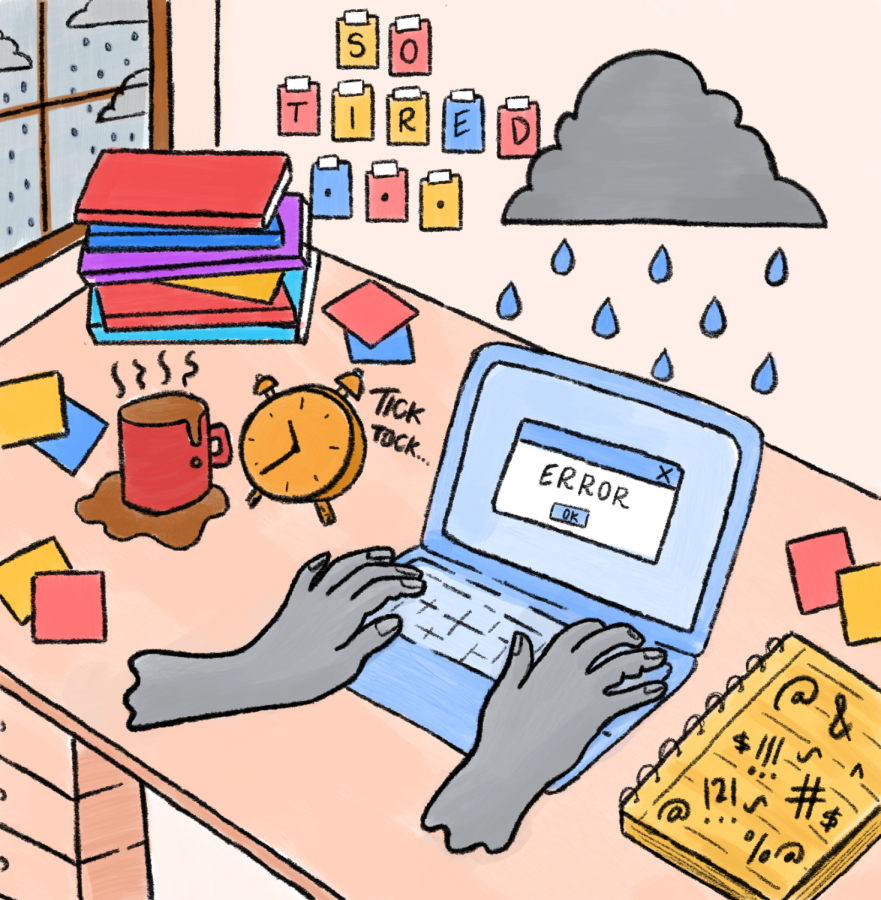OPINION: Quiet quitting calls attention to workplace burnout
Quiet quitting is an approach to reject a hustle culture correlated with burnout.
Amid the Great Resignation, a record number of workers have resigned from jobs in pursuance of different employment since the beginning of the COVID-19 pandemic. From the influence of social media, the concept of quiet quitting is an emerging trend. Quiet quitting describes performing the bare minimum at work and quitting the idea of going above and beyond. An approach to rejecting a workaholic and hustle culture that has correlated with burnout, mainly among Generation Z. The struggle to achieve an ideal work-life balance reveals shortcomings of individual habits and the actions of employers.
Everyone inevitably experiences burnout. According to Christina Maslach, professor of psychology at the University of California, Berkeley and Michael P. Leiter, organizational psychologist, a large contributor to burnout stems from employees feeling a lack of professional autonomy, or influence over their work, resulting in less engagement. While quiet quitting embodies the notion of completing the minimum required duties, one can regain a sense of control through strict time management and setting personal boundaries.
According to a 2009 study published in the European Journal of Social Psychology, it takes 66 days, on average, for a new behavior to become automatic. The idea of lazing around at home can be tempting, but through self-discipline can one develop consistent habits and behaviors that can increase productivity. It is possible to be passionate about work while drawing reasonable boundaries around daily hours and workload. By developing a habit of organizing work days through a weekly planner or noting down tasks on a list, one can create a space to allocate time for a single day out of the week, free of work, to do something enjoyable and recharge.
Through quiet quitting, workers are reacting to high stress levels by disengaging from activities that can boost passion and energy. According to Lee Chambers, psychologist and well-being consultant, quiet quitting is a coping mechanism to address chronic overworking and can have a detrimental effect on feelings of personal fulfillment. Instead of withdrawing from activity when met with feelings of burnout, the solution, as counterintuitive it seems, is to fight back with engagement in hobbies and activities.
Being actively engaged with one’s interests that are emotionally connected to positive feelings increases motivation and productivity. There are a wide range of activities to incorporate into practice, such as working out, creating art or mentally and spiritually recharging through meditation. A simple replacement of tasks, like reading or recreating an online recipe instead of binge watching a T.V. series, can be a way to discover beneficial hobbies. Time and involvement in bettering self-care is productive work.
While the struggles of maintaining a healthy work-life balance comes from minimal control over one’s lifestyle choices, employers can proactively change the course of one’s work life to uplift employees. According to Ed Zitron, the CEO of EZPR, a media consulting business for tech startups, the term “quiet quitting” stems from companies exploiting employees’ labor and businesses benefitting from a culture of overworking without additional compensation. Individuals who agree with working to exhaustion as a norm in the workplace must conceptualize that Generation Z and future generations are learning from the mistakes of the past.
Employers taking advantage of drained employees is a sign of a lack of empathy toward workers and an indicator that it is time to take initiative in providing access to benefits and mental health services. Starbucks is a corporation leading an initiative to improve the quality of life for workers, offering access to 20 free therapy sessions with a therapist or coach through Lyra Health.
As large corporations step forward to act as models for others to follow, quiet quitters can feel respected and cared for through provided services. Burnout is proof of dedication and commitment to a role, and days off as well as vacations are necessary. If managers provide meaningful options and autonomy over work to curate a healthy culture, the likelihood of increasing willingness to participate in job roles can return with a renewed sense of passion.
Factors such as personal habits, employers and glorification of hustle culture contribute to feelings of unfulfillment. Quiet quitters must redirect a mindset toward value in purposeful work and remember that it is never too late to change the narrative.


